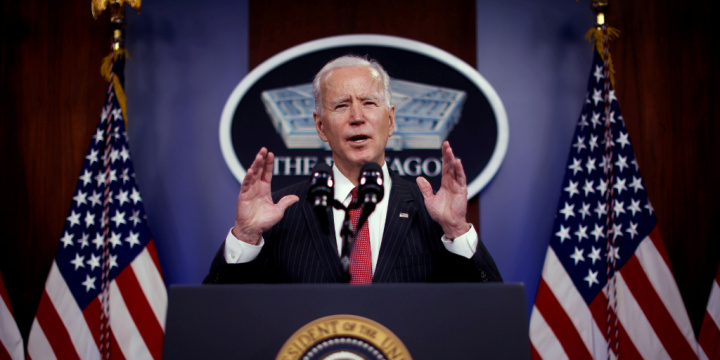Power Corrupts, Weakness Corrupts Absolutely
 by Dan Schueftan / JNS.org
by Dan Schueftan / JNS.org

US President Joe Biden delivers remarks to Defense Department personnel during a visit to the Pentagon in Arlington, Virginia, U.S., February 10, 2021. REUTERS/Carlos Barria/File Photo
JNS.org – In the days before American liberalism jumped off track towards a warped “progressive” agenda, one leading and wise liberal supplied a brilliant twist to the famous quote by Lord Acton, “Power tends to corrupt and absolute power corrupts absolutely.” Democratic candidate Adlai Stevenson said: “Power corrupts, but lack of power corrupts absolutely.”
In any struggle, especially when open democratic societies battle authoritarian, aggressive and violent elements, at home and abroad, nothing is worse than showing weakness.
President Theodore Roosevelt suggested: “Speak softly and carry a big stick.” Democratic leaders who have followed the first half of Roosevelt’s suggestion while forgetting about the second have encouraged violence, bringing about only tragedy.
Biden apparently insists on learning some lessons the hard way. Even when he adopts tough rhetoric, he focuses on minor issues on the global agenda. Since Biden is not obligated, as Obama was, to a dogmatic ideology of weakness, it’s still early to pass judgment. He may yet come to his senses. But it is clear that the United States’ enemies smell weakness—and are responding, as expected, with provocations.
China’s policy with Taiwan, the aggression of Iran and its subsidiaries, the concentration of Russian forces on the border with Ukraine and the firing of North Korean missiles into the Sea of Japan all signal the same thing.
US allies—in India, Japan, Australia, the Philippines, Eastern Europe, Saudi Arabia, Egypt and Israel—have reason to worry. And this is not just about foreign policy: Millions of migrants, seeking to escape the chaos and distress in central America, assume the United States is in fact losing its sovereignty over the border with Mexico and are arriving en masse.
Iran is aware of Biden’s weak negotiating stance and is trying to dictate, with defiance and threats, an insulting deal that will portray him as weak. His attempts to look aggressive are obvious, bordering on pathetic: a demand that Iran halt its violations of the 2015 nuclear deal as a precondition to removing sanctions, and a very limited bombing campaign in Syria against Iranian-backed militias. The Iranians aren’t impressed, nor should they be. Right after Biden set them those tough conditions, his administration began to water them down and sound voices of retreat.
Tehran knows Biden’s “soft voice” is not backed with a “big stick” and a willingness for continued confrontation. It’s not certain they will even let him fold in a way that won’t embarrass the United States.
Biden makes sure to tarnish his ties with regional allies, from Israel to Saudi Arabia. In Yemen, the public American sanctions on aid to Saudi Arabia intensified the provocations of rebels backed by Iran. Bahrain and Kuwait understood the damage wrought by the new US policy and publicly expressed their fears. Egyptian President Abdel Fattah el-Sisi is preparing himself for the worst. Pro-US states—Jordan, Morocco and others—know the drill from the Obama (and Carter) days and understand the consequences of this change.
On the Iranian issue, so crucial for Israel, one can only hope the Iranians will continue to take a hard line, one even Biden won’t be willing to accept. They may do so, due to the pitiful US stance, while relying on their strategic agreement with China, even though its chances of realization will be determined in the global arena. If Iran gives Biden a reason for a conciliatory policy that will allow the ayatollahs to realize their regional plan, Israel will have to act in a severe and dangerous manner.
Dan Schueftan is the director of the International Graduate Program in National Security Studies at the University of Haifa’s National Security Studies Center.
This article first appeared in Israel Hayom.
 Columbia University Shutters Campus as Jews Fear for Safety, Critics Call for President to Resign
Columbia University Shutters Campus as Jews Fear for Safety, Critics Call for President to Resign ‘Hamas, We Love You!’ A List of the Chants, Statements From Columbia University’s ‘Gaza Solidarity Encampment’
‘Hamas, We Love You!’ A List of the Chants, Statements From Columbia University’s ‘Gaza Solidarity Encampment’ ‘Useless Pigs’: Anti-Israel Demonstrations Rage at Yale University, Forcing Police Intervention
‘Useless Pigs’: Anti-Israel Demonstrations Rage at Yale University, Forcing Police Intervention Anti-Israel Protesters Interrupt Chelsea Handler Comedy Show Because of Her Support for Jewish State
Anti-Israel Protesters Interrupt Chelsea Handler Comedy Show Because of Her Support for Jewish State Israeli Hostage Families Make Passover Plea for Return of Missing Loved Ones
Israeli Hostage Families Make Passover Plea for Return of Missing Loved Ones Palestinian Arrested for Murdering Israeli Teen in West Bank Terror Attack
Palestinian Arrested for Murdering Israeli Teen in West Bank Terror Attack A Passover Guide for the Perplexed 2024
A Passover Guide for the Perplexed 2024 Appeasing Iran Will Lead to More Attacks on All of Us
Appeasing Iran Will Lead to More Attacks on All of Us CNN Platforms Biased Journalists in Coverage of Iran, Gaza
CNN Platforms Biased Journalists in Coverage of Iran, Gaza Fatah: Hamas Kills Aid Workers and Steals Food for Itself
Fatah: Hamas Kills Aid Workers and Steals Food for Itself



 A Passover Guide for the Perplexed 2024
A Passover Guide for the Perplexed 2024 Palestinian Arrested for Murdering Israeli Teen in West Bank Terror Attack
Palestinian Arrested for Murdering Israeli Teen in West Bank Terror Attack Israeli Hostage Families Make Passover Plea for Return of Missing Loved Ones
Israeli Hostage Families Make Passover Plea for Return of Missing Loved Ones Anti-Israel Protesters Interrupt Chelsea Handler Comedy Show Because of Her Support for Jewish State
Anti-Israel Protesters Interrupt Chelsea Handler Comedy Show Because of Her Support for Jewish State Biden Declares ‘Ironclad’ Support for Israel in Passover Message Amid Tensions Over Gaza War
Biden Declares ‘Ironclad’ Support for Israel in Passover Message Amid Tensions Over Gaza War